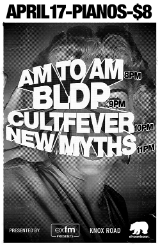 This is the first installment in a series that looks at the lives of musicians as they walk down new paths in life. Whether for family, health or other creative endeavors, the choice to take time off from music is never easy.
This is the first installment in a series that looks at the lives of musicians as they walk down new paths in life. Whether for family, health or other creative endeavors, the choice to take time off from music is never easy.
Jon Ragel sits in his southeast Portland kitchen, gazing out the window. We’re eating tacos and drinking beer, talking about his recent transformation from musician into writer. “It just seems like a natural thing to do,” he says at last. “You gotta do it.”
Ragel has spent nearly his entire life playing music. He’s played in several bands, but split off on his own in 2005 to become Boy Eats Drum Machine, a solo project that earned him a strong following across the west. Acclaim followed – most of his records have been well received by critics, and a pair of songs have found their way into the mainstream subconscious by way of GoPro and Major League Soccer.
But this past winter, sometime around his 39th birthday, Ragel suddenly decided to change his direction. “I still don’t know why,” he tells me. But that’s not entirely true. He knows all too well what drew him away from music: the allure of the novel. One day a story fell into his head, he says, expanding and swelling, quickly outgrowing the space in his mind. He had to write it down.
His story is set in a future dystopia, one where society has made the prison population into a viable commodity by turning their blood into something farmable. The narration follows a man who gets himself imprisoned to steal the technology that makes it all possible. It’s sharp, sociopolitical science fiction – a far cry from Ragel’s songwriting.
Still, the story shows Ragel’s hallmark creative flair. The prison where much of it takes place is a surreal facility laid out in the shape of a human body. To get there, shackled prisoners trek across the vast, empty landscape of eastern Oregon. And while this world is clear in Ragel’s mind, the process of getting it out has been tricky.
Although he’s adept at writing songs, he’s a novice when it comes to prose. He started by thumbing through books by George Orwell and Cormac McCarthy to get a feel for the art of writing. By spring he had written a few chapters of the story, joining up with a Portland writers group to get feedback on the rough draft.
The whole process has been draining, Ragel tells me. As he’s learning, writing literature is very different than writing music. “You can’t just feel your way into it,” he says. “The cup’s empty every time you come back.” Some days it’s easy to fill the cup, but on the frustrating days when the tap runs dry, it’s easy to lose sight of the point of it all.
“I think the last thing I want to think about as an artist is how futile it is to do art,” he says. “It can be a drag on the process.” I ask him if it isn’t the same writing music, if like writing a book there are good days and bad, full cups and empty cups. It’s not the same, he tells me. “It’s easy to put out albums, it’s easy to get shows,” he says. Putting months and years of creative energy into a singular, intimate piece of art is much different. There’s so much more pressure.
For Ragel, who released a whirlwind five albums over the last seven years, touring extensively in the interim, the slower pace is a godsend. For the first time in a long time he’s able to spend his summer in Portland. Instead of sitting in a car, driving hours across Eastern Oregon and Idaho, he can sit in his kitchen, making tacos and drinking beer. He can take time to focus on his art.
The question that remains, that still rings dully in his ears, is what kind of art he wants to make. Although he’s focused on writing at the moment, he hasn’t discounted bringing music into his project as well. Alongside the novel itself, Ragel is planning to record a full soundtrack, as well as an audio book. His idea is to release the whole package as a multimedia story.
“I think it’s important for me to do a little [music] … it’s not something I’m just going to stop doing all together,” Ragel says. And how could he? Music is his first creative love, it’s the way in which he truly expresses himself to the world. He may have caught a new creative bug, but it won’t be enough to kill the music within him. The two worlds might even collide to create something stronger than before.
And while the stakes seem so high, and the possibilities so great, the man known as Boy Eats Drum Machine is taking things slow. “I’m not feeling rushed to do anything,” he tells me, finishing his beer and looking out the window. “I’m feeling rushed to become a better artist.”








